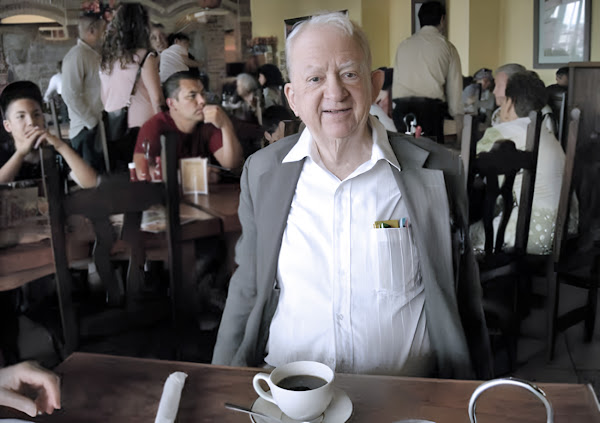March 09 2013
The Boston Globe, Boston, Massachusetts, Saturday, March 09, 2013
Alan Brian Calhamer, 2011.Allan Calhamer; made board game for the power-craved
By Margalit Fox, New York Times
New York—Allan Calhamer, a Harvard-educated postman who invented Diplomacy, which for more than half a century has been a favorite board game of calculating, caffeinated intellectuals, died Feb. 25 in La Grange, Ill. He was 81.
The cause was heart and kidney failure, his family said.
Released commercially in 1959, Diplomacy has sold more than 300,000 copies. It was reported to have been a favorite game of Henry Kissinger; John F. Kennedy and Walter Cronkite were also said to enjoy it. In 1984 it was named to Games magazine's Hall of Fame, alongside such stalwarts as Monopoly, Clue, and Scrabble.
Over the years, Diplomacy—“Dip” to its most fervent adherents has inspired a welter of fanzines, international tournaments, and, most recently, online competitions.
Diplomacy plays out on a map of pre-World War I Europe, with each player — it is ideally suited to seven — representing one of the Great Powers of the age: England, France, Germany, Italy, Austria-Hungary, Russia, and the Ottoman Empire.
The game ends when a player captures 18 of the board's 34 strategic “supply centers,” or when all players still standing agree that they are simply too bleary-eyed and cranky to continue.
Unlike many board games, Diplomacy leaves nothing to chance: there are no dice to roll (as in the comparable board game Risk, which relies on armies to conquer the world), no cards to shuffle (ditto), no pointers to spin. Instead it relies on strategy, cunning, and above all verbal prowess.
In each of the game's compulsory negotiation periods, which involve whispering furtively in corners while simultaneously routing eavesdroppers, players in weaker positions who band together against those in stronger ones.
What emerges from these sessions, which govern the moves on the board, is a world of quicksilver alliances: joint military campaigns are planned; deals are made, then abrogated, and new agreements arise to take their place. Foe is friend and friend is foe, and it is seldom possible to tell the two apart.
In short, Diplomacy rewards all manner of mendacity: spying, lying, bribery, rumor mongering, psychological manipulation, outright intimidation, betrayal, vengeance and backstabbing.
It also rewards staying power. A typical game lasts at least six hours, and 16-hour games are far from unknown. In Diplomacy-by-mail, a version for far-flung players first popularized in the early 1960s, a single game can unspool over years.
Mr. Calhamer was an honored guest at many Diplomacy tournaments, at which he was by all accounts a good player but not a great one he was apparently too kindly to succeed at his own game. The rest of the time he lived quietly in La Grange Park, a Chicago suburb, where he worked as a letter carrier while tinkering with other games, all unproduced.
Allan Brian Calhamer was born in Hinsdale, Ill., and reared in La Grange Park; his mother was a teacher and his father an engineer.
As a boy, exploring the attic of the family home, he encountered a book of old maps and was captivated. On its pages, the past really was a foreign country, with evocative names Livonia, Courland, the Ottoman Empire that conjured a distant era. From that book, Mr. Calhamer said long afterward, Diplomacy would spring.
At Harvard, from which he graduated cum laude in 1953, the young Calhamer studied European history with Sidney Bradshaw Fay. Reading Fay's seminal 1928 book, “The Origins of the World War,” about back-room intrigue among the Great Powers, he thought, “What a board game that would make!”
Mr. Calhamer developed his game, originally called Realpolitik, in 1954, while he was enrolled at Harvard Law School. Law students, he found, adored it, as it enfranchised aggression, and it was refined over many late-night sessions in his room.
Disinclined to pursue a cutthroat career, however, Mr. Calhamer left law school before graduating. He lived for a time at Walden Pond in homage to his idol, Henry David Thoreau; he later worked briefly as a foreign service officer in Africa and a park ranger at the Statue of Liberty.
In 1959, after Diplomacy was rejected by several game publishers, Mr. Calhamer had 500 copies produced at his own expense, selling them by mail for $6.95 apiece. It was acquired shortly afterward by Games Research and has since passed through many corporate hands, including those of Avalon Hill and Hasbro. The game is currently published by Wizards of the Coast, which also makes Dungeons & Dragons.
On the strength of Diplomacy, Mr. Calhamer was hired by Sylvania's Applied Research Laboratory in Waltham, to bring his analytical stills to bear on real-world military problems. But he chafed amid corporate culture and left after six years. With his wife, the former Hilda Morales, he settled in his hometown. Besides his wife, whom he married in 1967, Mr. Calhamer leaves two daughters, Tatiana and Selenne Calhamer-Boling.
Mr. Calhamer remained deeply, if quietly, proud of Diplomacy, and though the royalties did not make him rich, they did once let him buy a Mercury Monarch.
For 21 years, until his retirement in the early 1990s, Mr. Calhamer delivered the mail in La Grange Park. He took pleasure, his family told The Chicago Sun-Times this week, in factoring into primes the license-plate numbers of cars on his route.
He almost certainly took pleasure, too for this thought was doubtless not lost on him in the idea that on any given day, slung unobtrusively over his shoulder, there might lurk a letter from one Great Power to another, filled with all the threats, blandishments and cunning hollow promises Diplomacy entails, awaiting delivery by its creator.
























